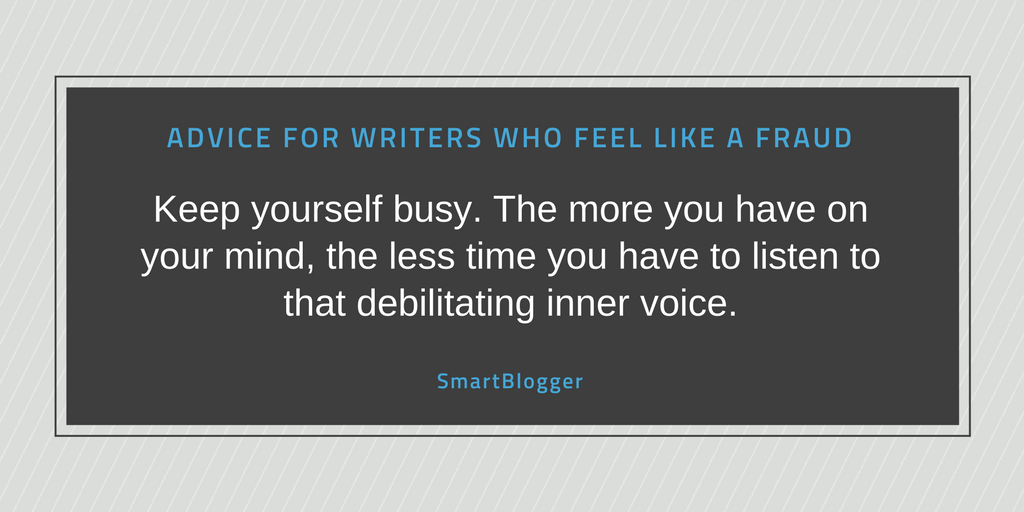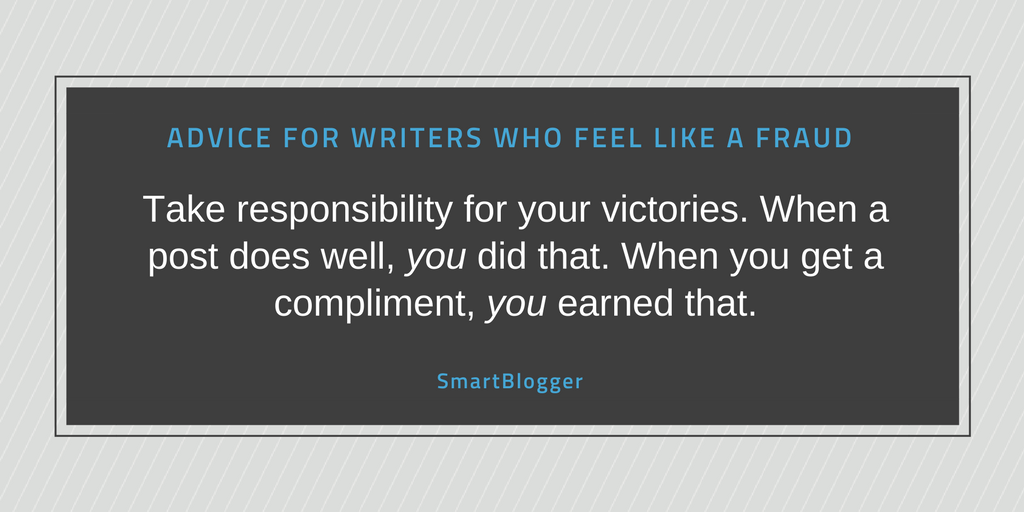
Let me guess …
Every success in your writing career has been a fluke.
When people praise your work, they don’t know what they’re talking about.
You’ll never measure up. You’re not a real writer. And any day now, everyone will see you for the fraud that you are.
That’s how you feel, anyway.
You read other blogs and feel crushed at how little you know and how little you have to offer. You wonder why you even bother with your own blog when so many great writers do it way better than you ever could.
Well, here’s a secret …
Those writers you admire probably feel the exact same way.
Even famous writers like Neil Gaiman, Tina Fey, and Seth Godin are on record that they still feel like frauds — like they don’t deserve their success and they’re getting away with something.
We all do.
The Voice Inside My Head That Tells Me I’m Unworthy
I have been a freelance writer for over three years, but I still feel I have no right to claim that title — writer.
I have a nagging voice inside my head that constantly reminds me of my unworthiness. It tells me to give up before I’m laughed off the Internet. That I’ll never compare to other writers — the real ones.
It provides a symphony of thoughts like:
“Who do you think you are?”
“Why would anyone care what you have to say?”
“Sooner or later, they’ll find out you have no clue what you’re doing.”
I call this voice the “Imp.” Her full name is Imposter Syndrome, and chances are you’ve already met. If you’ve ever had that dread of being outed as a fraud because you don’t stack up to other writers, you’ve experienced Imposter Syndrome, and you have an Imp of your own.
Imposter Syndrome is common across industries, but writers are especially susceptible.
Why is that?
Why Do We Feel Like Frauds All the Frickin’ Time?
Writing is a peculiar profession.
One thing that sets us apart is that we work in isolation.
That means nobody’s around to tell us we’re doing a great job until we put it out there for total strangers to judge. We’ll often work for a while on a project with no direct feedback, so it’s easy to start second-guessing our ability.
We have nobody to discuss our doubts with, so we are locked into internal conversations, which makes the Imp’s voice sound all the louder.
Working in isolation also means we don’t have any peers around to compare ourselves with, which leads us to compare ourselves with industry giants. No wonder we feel like we don’t measure up!
This also leads to us to create standards for ourselves that don’t exist. After all, you don’t see the time and effort other writers put in. You just see the result. That blog post that seems so effortless could be the result of weeks of work. But when you fail to churn out a perfect first draft, it means you’re an amateur.
The writing profession becomes even more dangerous when you step outside your comfort zone. You may have pitched an article to a large publication, and to your horror, they actually said yes. Then the insecurity takes hold and the fear of being exposed as an imposter rears its familiar head.
Sigh …
So are we doomed to deal with this nagging voice throughout our profession?
I’ll be honest; you may never fully get rid of it.
But you can learn to live with it.
How to Beat Imposter Syndrome: 4 Tips from a Writer Who Knows How You Feel
The first step on your road to recovery is to be aware that isolation, new challenges, and pointless comparisons are common causes of Imposter Syndrome. You may not always be able to avoid them, but if you are mindful of their effect, it will help you wrestle your Imp to the ground when needed.
And here’s how to do it.
#1. End the Isolation and Surround Yourself with Writers
The first step to beating Imposter Syndrome is to tackle one of its main causes: isolation.
You need to make friends with other writers who are at the same stage in their careers. You need to have people around you who understand you, who make you feel part of the writing community instead of an intruder.
Here are a few ways to meet other writers:
- Join online writing communities (forums, Facebook groups, etc.)
- Find local writing meetups on meetup.com.
- Attend writing or blogging conferences.
Meet writers who are your peers, see who you get along with, and then join or start a mastermind group. Get together every week with a small group of people (around 4–6) and discuss what you’ve been up to and what’s been on your mind.
Share your fears and frustrations, and find comfort and reassurance in your similar experiences. You’ll inspire and encourage each other to grow as writers.
And as you grow, give back to the community by mentoring less experienced writers. Not only will you be helping others, your confidence will strengthen as you prove to yourself you do know what you’re doing and people do care what you have to say.
It’s rewarding and empowering at the same time.
#2. Prepare for Failure AND Success (Because Both Can Be Crippling)
The Imp comes with a cruel twist. It won’t just berate you for failures; it will berate you for successes as well.
When a pitch is rejected or an article bombs, your Imp will use it to convince you that you don’t have what it takes. Having a few failures in a row can make you want to curl up in a ball of despair.
On the other hand, when your writing is successful and gets glowing responses, your Imp will convince you it was a fluke. It will make you feel like you’ve now set expectations you’ll never be able to meet again.
The effect is the same. You procrastinate.
Because no idea feels good enough. You never feel prepared enough. And nothing you write feels like it stacks up.
You get stuck over-analyzing and don’t start anything new.
But the trick to beating your Imp is to keep yourself busy. Because the more you have on your mind, the less time you have to listen to that debilitating inner voice.
So prepare for these situations by creating an action plan. Have a list of tasks ready for whenever they come up, so you won’t have time to drive yourself crazy.
For example, when a pitch is rejected, you might make a point to ask for feedback, find different sites to pitch, or come up with 20 new headlines.
When a post takes off, you might make a point to read all the comments, identify what connected with readers, and see if you can find ideas for a follow-up post.
Whatever you do, stay active, and end each plan with you writing your next post.
#3. Log Your Victories to Reinforce Your Self-Esteem
Most of us have an instinct to devalue our talent. When a post does well, we think we got lucky. When someone compliments our work, we shrug it off.
But those are terrible habits.
You need to take responsibility for your victories.
When a post does well, you did that. When you get a compliment, you earned that.
And you should never forget it.
So log your victories in a “nice things” file. Log accomplishments big and small. Log every compliment you receive. Print them out or store them in Evernote.
Then read them on a regular basis. It will banish your Imp and reinforce your belief that you have talent. It will reinforce your belief that people value your work. Plus, it just feels good.
It’s okay to bask in your own glory from time to time.
#4. Remember That Nobody Expects You to Be Perfect (Except You)
As writers, we put ourselves out there as experts, which can feel intimidating.
You feel pressured to put forth a veneer of perfection. You don’t want to show the cracks in your knowledge, as that would show everyone you’re not an expert at all.
Because you don’t feel like one. You’re certainly not as much of an expert as those other guys, right? Because they know more than you?
So what if someone asks a question you don’t have the answer to? What if your post doesn’t include everything an expert would know? What if everyone realizes you don’t know everything?
Well, relax. Because readers aren’t looking for the holes and imperfections in your posts. They’re more interested in what you do know than what you don’t. The only one who’s worried about the latter is you.
Readers only care whether your knowledge and experience can help them reach their goals. You may not know as much as that other expert, but if you can do that, you’re expert enough for them.
Remember that.
You Are Not a Fraud, You Are a Writer
Your successes aren’t flukes.
You deserve all the praise you get.
And you are a writer — a real one.
So it’s time you finally convince yourself.
It’s time you fight back, wrestle your Imp to the ground and say, “Enough! I am smart, I am brave, and I earned everything I’ve worked for. I AM NOT A FRAUD!”
I’m right by your side, my fellow writer friend. Let’s do this together.
Let’s tear down the walls of isolation and surround ourselves with writers. Let’s stop feeling intimidated by success. Let’s stop expecting nothing but perfection from ourselves.
Let’s promise to keep writing no matter what, and let’s take responsibility for all the victories along the way.
Are you with me?
source https://smartblogger.com/imposter-syndrome/




No comments:
Post a Comment